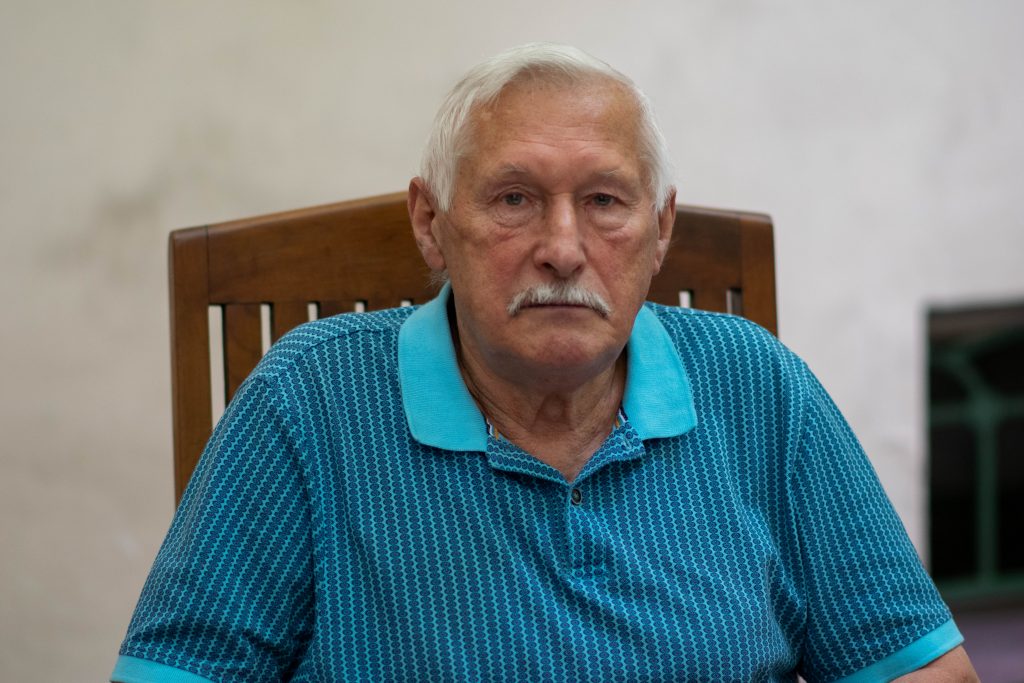Roman Zaverukha

Roman Zaverukha was born on October 11, 1940 in the village of Hadynkivtsi (now Husiatyn district, Ternopil region).
His grandfather, Vasyl Zaverukha, served in the Ukrainian Galician Army and died during a typhus epidemic in Lviv. His parents, Antin and Mariia Zaverukha, were wealthy peasants. They owned 2.5 hectares of land and had livestock: mares, cows, goats, chickens, and more. In addition to Roman, the family had two older children – brother Mykhailo and sister Olha.
REPRESSIONS AGAINST FAMILY MEMBERS
On June 27, 1941, Antin Zaverukha was arrested by the Husiatyn District Department of the NKVD. He was accused of being a member of the OUN underground resistance movement. At the beginning of the German-Soviet war, he and other political prisoners were driven from the prison in Chortkiv to Uman and shot there.
On September 17, 1948, the Probizhnyanskyi District Department of the State Security Service arrested Roman’s older brother – Mikhailo. He was accused of having ties to the OUN underground movement. According to the resolution of the Special Meeting of the State Security Service of the USSR of June 7, 1949, he was sentenced to 10 years in prison. He was detained in Dzhezkazganlaz in Kazakhstan. He was released on March 30, 1955. After returning to Ukraine, he lived in the Donetsk region.
DEPORTATION
Mariia Zaverukha tried to avoid further repression against her family by joining the collective farm: “My mother was told, “Mariyka, enroll in the collective farm and you will not be taken out.” Mom enrolled. Then she gave a cow, a mare and a goat to the collective farm”. However, on April 29, 1950, 9-year-old Roman and his mother were taken by cart from their native village to the district center of Probizhna (now Chortkiv district of Ternopil region), and from there by truck to a transfer point in Berezhany. The family of Anna Chorna’s paternal sister was also taken away with them.
They were detained at the checkpoint for about two weeks: “Inside there was a courtyard where we were taken for a walk. And on the sides, there were rooms everywhere, so-called cameras. They were somewhere like 5X5 or 5X6, 25 square meters. And there were all of us: small children, old and crippled”. From Berezhany they were deported by freight train to Novosibirsk. From there by steamer on the rivers Ob and Kopylovskaya Ket they were transported to the village of Zaikino (now Kolpashevskyi district of Tomsk region, Russian Federation). Already from Zaikino Roman and his mother were transported by truck to the village of Pishchane (now non-existent): “There was almost no land, only sand, well, and pines… There was nowhere to run – just swamps, lakes around”.
LIFE IN “SPECIAL SETTLEMENT”
In Pishchany, special settlers lived in barracks, several families in a room. Their forced labor was used in road construction, logging. Roman was forced to walk 12 kilometers to school, to the village of Pikovka. After school, he helped his mother, who worked at a sawmill. Ukrainian special settlers were the first to start growing vegetables in Pishchany – potatoes, tomatoes, cucumbers, onions. Using a prayer book brought from Ukraine, my mother performed religious rites, as there was no priest in the village.
After his release from the special settlement on October 2, 1956, Roman returned to Ukraine on his own: “I did everything I could, I went myself, although it cost me my health. Because, well, what my mother could give me – she gave me chicken and baked cookies. And I ate this all the way – well, I ate chicken at once, because it was impossible to keep for a long time – and I ate cookies. When I came to Chortkiv, I got biliousness. Because I ate only sweet cookies and drank tea”. Since Zaverukha’s house in his native village was confiscated in 1950, he lived with his older sister Olha in Chortkiv. A year later, his mother also returned.
Later, Roman moved to Lviv, where he graduated from the technical school with a degree in “Metal Cutting”. After being drafted into the Soviet Army, he enlisted in the construction battalion. For three years, he served as a rater at logging operations in the Perm region. After demobilization, he returned to Lviv and worked at the Lvivprylad plant as a turner, grinder, head of the tool shed, and deputy head of the tool shop. He is currently retired. He lives in Lviv.
